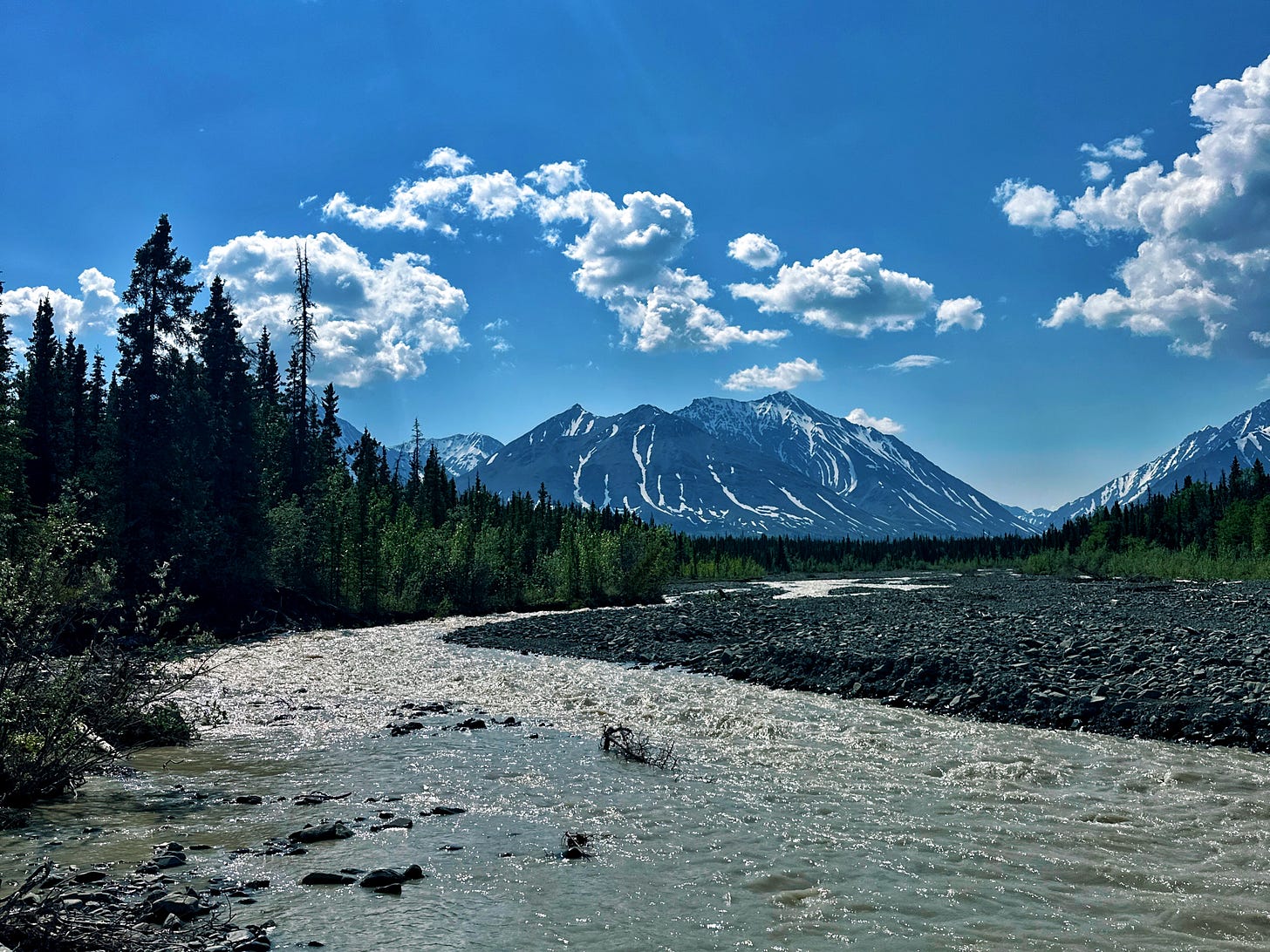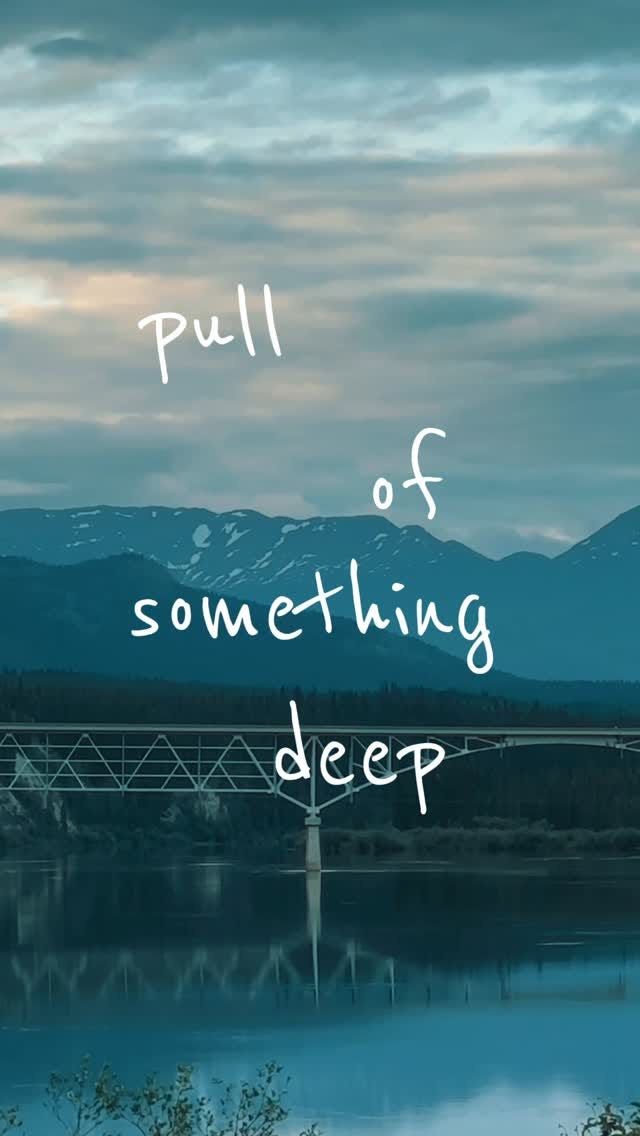Haines Junction, Yukon.
I haven’t written on Substack for a month.
Between that last essay and today, a devastating tragedy happened in my hometown—one that has shattered us. It’s changed me emotionally, spiritually, chemically, and continues to, as I examine the injury of this wound. I’ve been grieving, gathering with family and friends, trying to process the blunt force of this loss. I can’t say the words out loud. They sit in my throat like the ugliest curse I know.
Somewhere in the repetition (between weeping, distracting, circling) I began writing poetry by hand, every morning. I’ve written around thirty or forty poems now. I don’t know if it’s good poetry, but it’s helping.
It’s hard to believe that my interview with German-Canadian poet, Ulrich Schaffer, was just a month ago. It feels like I’ve aged years since. I’m grateful for our talk, and even more for the connection that followed. Ulrich reminded me of something I had forgotten: that poetry doesn’t have to be pretentious or clever. It just needs to speak. It can begin with one word. Just one. Then the next. Then the next.
When the loss came and I had no language, I started with one word. The words became like breath: arriving just after those first stunned minutes upon waking, when memory returns and reality settles in. Grief doesn’t want formality: it wants something honest. When I try to talk about it with people outside of my community, the whole thing starts to sound like a news report—detached and awful. Full sentences feel useless.
I’d rather talk in poetry.
Poetry has given me a way to speak of the ache of losing someone I’ve loved and known for thirty years. Someone who wasn’t just part of my life, but part of the land and rhythm of our community. His sudden absence feels like a chokehold.
Here’s one of the poems I wrote:
Borrowed Breath
1
My mother tells me to brace myself.
I hear the tide in her voice,
the pull of something deep,
unseen.
I whisper “No, Mom,”knowing
I can’t dam this flood.
2
I drift to the roadside,
salt on my lips,
breath snagged
in my throat.
3
Grief comes
like a wave.
It possesses
my movement,
my breath.
I don’t
recognize
this current.
Its strength
doesn’t feel
like my own.
4.
She tells me a story
that sounds like fiction.
It drags me down, down, down,
into the black unknown.
I fight to rise.
It yanks me down.
5.
And I remember what a surfer girl told me
when I found her half-drowned,
Costa Rican seaweed threading her hair,
board adrift in the shallows:
“When a current
this strong takes you,
all you can do is go limp.
Feel your body
fold and stretch
like an accordion
of bone and breath.
It will thrash you,
spin you,
carry you to the bottom.
And when you think
you've touched
the sea floor,
ask for air anyway.
The Great Sea
will slip you
a borrowed breath,
a hush inside the roar.
And you will feel
an invisible hand
on your back
as you breathe.”
6.
Let it
fill your
deep-water lungs.
Exhale
everything.
7
The hardest thing
is holding two worlds:
breath in the lungs,
loss in the bones.
8.
A question claws
at my throat.
No answer
lives in this language.
Only salt and stars.
So I let the ocean
take me.
Let it drown
the questions.
Let it fill
my chest
with borrowed breath.
9
Now I speak
to moon, to tide, to galaxy;
the only places left
where grief still knows
how to hold
both air
and the weight
of what we lose.
Here’s a shorter version of this poem to video.
It gave me a lot of anxiety sharing this poem to social media but I forced myself to do it.
Why do I get so bogged down when it’s time to share my raw, real voice?
I heard someone use the word “inertia” recently and got curious about where it came from. I’d always equated it with laziness, procrastination, a lack of drive. But when I looked it up, the definition surprised me.
Inertia is Newton’s First Law of Motion: an object in motion stays in motion; an object at rest stays at rest. It’s resistance to change. It’s what makes your body jerk forward against your seatbelt when the car stops suddenly. Your body wants to keep moving, but inertia holds you back.
Have I been still too long?
Is there something inside me that longs for movement? For more truth? For deeper connection? Maybe inertia isn’t the enemy…maybe it’s just the quiet before momentum.
I was listening to a conversation between Anderson Cooper and Stephen Colbert—two men who’ve lived through profound grief. (A caring friend slipped a link to the podcast in my inbox). Colbert said something that stopped me cold: he’s grateful for the deaths of his father and brothers. At first, I recoiled. How could he say that?
But then I understood. He wasn’t grateful they were gone. He was grateful for what grief gave him: for how it carved him open, for the depth it brought, the compassion, the clarity.
And angrily, I found myself nodding through tears. Because even in my own loss, something is stirring. A quiet voice is asking me to rise and to write. It was in the dramatic slam of the door to the room of my friend’s vast life (Colbert used this metaphor and it’s beautiful) that the floor trembled beneath me. The foundation I had planted my feet on cracked, and somehow, that break got me out of my chair.
I’m fucking angry and hurt. I’m devastated—for my town, for his wife, his daughter and son, his parents, his brothers, and his beautiful, sprawling family—who are like the cytoplasm of our community. And for all the kids in town who will feel the ripples of this violence for years to come. This isn’t something we can move on from. I don’t think anyone can.
Almost three weeks after his death, I joined a Zoom call with another one of my favorite poets,
. The theme was courage in poetry. Hundreds of us were there, listening to him speak and read. At the end, participants could submit questions, and his assistant would select a few.He answered mine.
My question to David Whyte:
You’ve spoken about how the mind creates stories when we’re afraid, and that deeply resonates. I’m standing at the edge of a great internal shift, following a recent and profound loss. I write a Substack newsletter and feel an urge, almost a calling, to share more of myself through my writing. And yet, I find myself afraid. Not of criticism exactly, but of some nameless thing.
How do we move through the inherited shame that rises when we attempt to speak our truth in public?
His response to my question:
“Well, the shame is good actually… it’s just you feeling the distance between what you want and what you are. What you can be, and what you are. And that shame is the access along which you will write. The very fact that you are feeling a real fear is a necessary dynamic for every writer.
If you’re just writing out of strategy—out of some idea you have in your head you want to promulgate in the world—you do not get good writing.
No, you’re going to write about your fear. You’re going to write about the way your body feels in that fear. You’re going to write about what it feels to be tremulous at that doorway, at that threshold, in that hallway that leads you to where you want to go. That’s what you need to write about, even if it’s just two or three lines in every Substack post.
Just be as real as possible with what you’re afraid of.
What you’re afraid of is not standing between you and your writing. What you’re afraid of is your writing…”
This exchange with David felt like a gift from the unseen, delivered with a lightness and playfulness that somehow made its way through my heaviness and landed right where I needed it.
I’m learning to write through the fear. To trust that even a trembling hand still moves. Maybe fear isn’t a block at all. Maybe it’s the invitation. And maybe writing is the way through.
Thank you, Roland: for the initiation, the tremor, the breath.
You will live on in our hearts and memories. There are no words.
Rest in peace.
Question for the comments: Have you ever written through grief? Where does your grief live: poetry, silence, story, the body?





I believe poetry and grief can even be the same thing. If you think it through... what is poetry if not grief of some sort polished up and screaming out of your head? I've never written anything if not for grief...likely that's the sound of broken gears, guiding you towards them - so that you can fix them. Life and love are a time bomb...when they tick away...anyone around u suffers the consequences. "The bird of Hermes is my name, eating my own wings to make me tame" - tru sacrifice, love and acceptance - endless life for the spirit.
The courage it takes to write through your grief is very powerful, and is a beacon to those that harbor feelings they judge the world might not be open to hearing them. You are a beautiful heart, my friend. I treasure the nuggets of inspiration you bring when I see a notice from your substack cross my inbox. HUGS my friend.